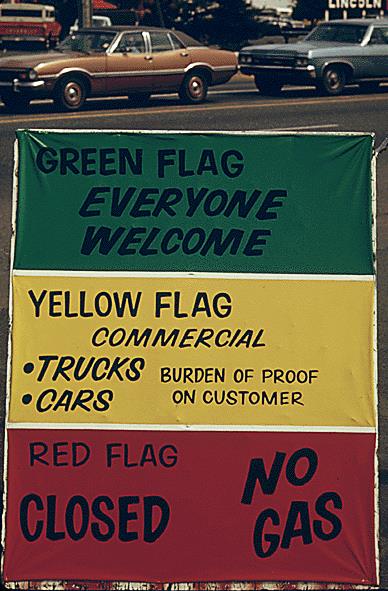1973: Stocks Crashing and Oil Rising (& CIRP moves to UCLA): Career Concerns among Incoming College Students
(Image is open access – http://en.wikipedia.org/wiki/1973_oil_crisis)
In 1973, the CIRP Freshman Survey left the American Council on Education (ACE) and moved to its current home at UCLA. The reasoning for this move is best explained by the authors of the 1973 Freshman Monograph:
“In order to maximize the utilization of these data in research and research training, responsibility for administering the CIRP was transferred in 1973 to the Graduate School of Education at the University of California, Los Angeles. The annual CIRP survey of entering freshmen is now administered from the Higher Educational Laboratory at UCLA under continuing support and sponsorship of the American Council on Education.”
CIRP and the Freshman Survey have remained at UCLA now for over 4 decades, with the continued support of ACE throughout the years.
A major recession hit the globe in 1973 due to inflation in the United Kingdom and the United States. In response, U.S. car makers closed multiple manufacturing plants, affecting over 100,000 workers nationwide. The prices of gas, food, and other bills skyrocketed as the economy tried to adjust for inflation.
This economic downturn set the stage for the introduction of a new question on the CIRP Freshman Survey. As people all over the country are thinking about the economy and jobs, students entering college in this context are beginning to think seriously about their careers. This new bank of items sought to gauge students’ priorities in planning for future careers. Specifically, the question asked:
Which of the following are important to you in your long term choice of a career occupation? (Very Important, Somewhat Important, Not Important)
- Job opening generally available
- Rapid career advancement possible
- High anticipated earnings
- Well respected or prestigious occupation
- Great deal of independence
- Chance for steady progress
- Can make an important contribution to society
- Can avoid pressure
- Can work with ideas
- Can be helpful to others
- Able to work with people
- Intrinsic interest in the field
The majority of students sought to have careers that were of intrinsic interest to them and provided them with opportunities to work with other people (70.9% and 62.8%, respectively). Gender differences in terms of career priorities were evident. For example, approximately half (49.7%) of males indicated that high anticipated earnings were “very important” to them in selecting a future career, compared to only a third (33.4%) of women. Further, 74.1% of women indicated that they wanted a career in which they could be helpful to others. In contrast, only 52% of men responded that this was “very important” to them.
These differences showed that although all students entering college were actively thinking about their career choices, stark gender differences characterized this process even as entering freshmen. Women tended to prioritize careers that involved helping others or contributing to society, while men tended to value careers in which there was more potential for higher earnings or opportunities for progress.
Astin, A. W., King, M. R., Light, J. M., & Richardson, G. T. (1973). The American Freshman: National Norms for Fall 1973.
Did you know…
21.7% of all entering freshmen had no brothers/sisters under 21.
42% of all entering freshmen had no brothers/sisters 21 or older.
60.8% of all entering freshmen had no brothers/sisters currently in college.

